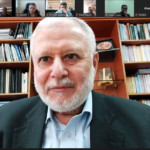Al-Zaytouna Centre for Studies and Consultations held on 6/10/2021 a two session panel discussion entitled, “The Options for the Resistance Forces to Get Out of the Palestinian Impasse.” Participants included a group of researchers, scholars and specialists in the Palestine issue.
The opening statement was by Prof. Dr. Mohsen Muhammad Saleh, who welcomed the participants and saw that the Palestine issue has several crises, including a leadership crisis, a crisis of institutions, and a crisis of conflicting paths, one of the resistance and the other of peace settlement. Moreover, the Palestine issue faces an occupation protected by global powers, whereas it lacks the strong support of the Arab and Muslim landscape. Saleh pointed out that the Sword of Jerusalem battle (dubbed by Israel Operation Guardian of the Walls), has led the resistance movement to take the lead, and Palestinians at home and abroad to be united; whereas when the Palestine Liberation Organization (PLO) (the Palestinian Authority (PA)/ Fatah leaderships) disrupted the elections and the reconciliation process, it led to a growing anger and frustration among Palestinians. There are Arab and international (and even Israeli) efforts to rehabilitate the PA, evanesce the victory of the resistance forces, and occupy these forces with lifting the siege of Gaza Strip (GS) and the reconstruction efforts.
Several future scenarios (near and medium) of the Palestinian situation were presented, including: First, ending the schism, achieving a reconciliation agreement and national consensus, and returning to elections. Another scenario is maintaining the status quo, i.e., the continuation of schism and political strife, and the disruption of the electoral process. A third scenario states that the regional and international efforts of rehabilitating the PA would succeed, enhancing its position in the Palestinian equation, while weakening the Hamas movement and the resistance forces. The fourth scenario states that the resistance forces would form an alternative national reference or a national coordination framework that adopts the resistance. As for the fifth scenario, it expects the gradual and accelerating collapse of the PA’s popularity and its clash with the public, making it lose control over the land and the political situation; in addition to other scenarios.
Based on the positions of the Palestinian, Arab, regional and international parties, the most probable scenario was that of maintaining the status quo. However, there are chances for the scenario of forming a national alignment that supports resistance and pushes for changes in the official Palestinian institutions.
Participants discussed the priorities in order for the Palestine issue to progress; including overcoming the internal disagreements, which drain the efforts of managing the internal crises; develop an ambitious and realistic consensual vision, to develop Palestinian action in the West Bank (WB), GS, the 48 territories and the Diaspora; benefitting from the accumulation of resistance achievements, while developing its performance; expanding national alliances, and continuing the efforts to form a national resistance movement (a national coordination body). Concerning the Arab and Muslim countries, building an Arab and Islamic trend, at the popular and the political forces levels, that supports the resistance and the liberation of Palestine. While on the regional and international levels, important efforts must be made to develop regional and international relations, etc.





Leave A Comment